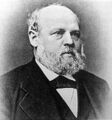Template:Selected anniversaries/May 26: Difference between revisions
No edit summary |
No edit summary |
||
| (2 intermediate revisions by the same user not shown) | |||
| Line 24: | Line 24: | ||
||1897: ''Dracula'', a novel by Irish author Bram Stoker, is published. | ||1897: ''Dracula'', a novel by Irish author Bram Stoker, is published. | ||
||1899: Otto E. Neugebauer born ... mathematician and historian of science who became known for his research on the history of astronomy and the other exact sciences in antiquity and into the Middle Ages. By studying clay tablets, he discovered that the ancient Babylonians knew much more about mathematics and astronomy than had been previously realized. Pic search | ||1899: Otto E. Neugebauer born ... mathematician and historian of science who became known for his research on the history of astronomy and the other exact sciences in antiquity and into the Middle Ages. By studying clay tablets, he discovered that the ancient Babylonians knew much more about mathematics and astronomy than had been previously realized. Pic search. | ||
File:Dorothea Lange 1936.jpg|link=Dorothea Lange (nonfiction)|1895: Documentary photographer and photojournalist [[Dorothea Lange (nonfiction)|Dorothea Lange]] born. Lange will be remembered for her Depression-era work for the Farm Security Administration (FSA). Her photographs will influence the development of documentary photography and humanize the consequences of the Great Depression. | File:Dorothea Lange 1936.jpg|link=Dorothea Lange (nonfiction)|1895: Documentary photographer and photojournalist [[Dorothea Lange (nonfiction)|Dorothea Lange]] born. Lange will be remembered for her Depression-era work for the Farm Security Administration (FSA). Her photographs will influence the development of documentary photography and humanize the consequences of the Great Depression. | ||
| Line 38: | Line 36: | ||
||1926: Frank Nelson Cole dies ... mathematician. Pic. | ||1926: Frank Nelson Cole dies ... mathematician. Pic. | ||
||1929: Hans Freeman born ... bioinorganic chemist and protein crystallographer. Pic search | ||1929: Hans Freeman born ... bioinorganic chemist and protein crystallographer. Pic search. | ||
||1933: Jimmy Rodgers dies. Pic. | |||
File:Chairman Dies of House Committee investigating Un-American activities.jpg|link=House Un-American Activities Committee (nonfiction)|1938: In the United States, the [[House Un-American Activities Committee (nonfiction)|House Un-American Activities Committee]] begins its first session. | File:Chairman Dies of House Committee investigating Un-American activities.jpg|link=House Un-American Activities Committee (nonfiction)|1938: In the United States, the [[House Un-American Activities Committee (nonfiction)|House Un-American Activities Committee]] begins its first session. | ||
| Line 46: | Line 44: | ||
||1938: Biochemist and pharmacologist John Jacob Abel dies. Abel contributed to the development of an early form of dialysis machine, and discovered how to isolate and crystallize insulin. Pic. | ||1938: Biochemist and pharmacologist John Jacob Abel dies. Abel contributed to the development of an early form of dialysis machine, and discovered how to isolate and crystallize insulin. Pic. | ||
||1957: Edward Hutchinson Synge dies ... physicist who published a complete theoretical description of the near-field scanning optical microscope, an instrument used in nanotechnology, several decades before it was experimentally developed. He never completed university yet did significant original research in both microscopy and telescopy. He was the first to apply the principle of scanning in imaging, which later became important in a wide range of technologies including television, radar, and scanning electron microscopy. Pic search | ||1957: Edward Hutchinson Synge dies ... physicist who published a complete theoretical description of the near-field scanning optical microscope, an instrument used in nanotechnology, several decades before it was experimentally developed. He never completed university yet did significant original research in both microscopy and telescopy. He was the first to apply the principle of scanning in imaging, which later became important in a wide range of technologies including television, radar, and scanning electron microscopy. Pic search. | ||
||1969: Allan Haines Loughead dies ... engineer, co-founded the Lockheed Corporation. Pic search | ||1969: Allan Haines Loughead dies ... engineer, co-founded the Lockheed Corporation. Pic search. | ||
||1969: Apollo program: Apollo 10 returns to Earth after a successful eight-day test of all the components needed for the forthcoming first manned moon landing. | ||1969: Apollo program: Apollo 10 returns to Earth after a successful eight-day test of all the components needed for the forthcoming first manned moon landing. | ||
| Line 67: | Line 65: | ||
</gallery> | </gallery> | ||
{{Template:Categories: May 26}} | |||
Latest revision as of 19:41, 29 May 2024
1497: Mathematician and architect Antonio Manetti dies. He investigated the site, shape and size of Dante's Inferno, and wrote a biography of the architect Filippo Brunelleschi.
1667: Mathematician and theorist Abraham de Moivre born. His book on probability theory, The Doctrine of Chances, will be prized by gamblers.
1814: Glassblower, physicist, and inventor Johann Heinrich Wilhelm Geißler born. He will invent the Geissler tube, made of glass and used as a low pressure gas-discharge luminescence tube.
1895: Documentary photographer and photojournalist Dorothea Lange born. Lange will be remembered for her Depression-era work for the Farm Security Administration (FSA). Her photographs will influence the development of documentary photography and humanize the consequences of the Great Depression.
1938: In the United States, the House Un-American Activities Committee begins its first session.




